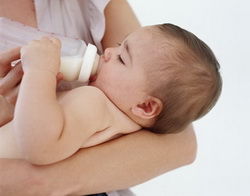Implantation IVF is the last step in an In vitro fertilization procedure. When the embryo had been successfully transferred to the uterus, the embryo will attach itself to the wall of the uterus lining. This process is called implantation.

Symptoms of Implantation IVF
Whether you had an IVF or a normal way of getting pregnant, symptoms of implantation are almost the same. Implantation IVF occurs when the embryo has successfully attached itself to the uterus lining. But due to some progesterone medications given to IVF patients, sometimes symptoms get mixed up with the injections' side effects. For an IVF patient, the only way to truly confirm a successful implantation is through a pregnancy test one or two weeks after an embryo transfer.
Spotting or Bleeding
It's normal to see some light spotting a week or so after an embryo transfer. The spotting or bleeding may be a cause of shed tissues when the embryo is trying to attach in the uterus lining.
Implantation Cramping
Implantation cramping is different from menstrual cramping. Having implantation cramping is a good sign that tells that implantation is happening right now at the uterus. Cramping usually occurs 8 to 10 days after an embryo transfer.
High Basal Body Temperature
Basal body temperature is a popular method for women who want to conceive. Through body temperature they can identify which days they are most fertile. And when expecting, a big difference in the body temperature will occur especially when a woman is going through the process of implantation.
Other symptoms include:
- Tender or sore breast
- Nausea
- Exhaustion and fainting
- Mood swings
- Frequent urinating
Foods to Eat during Implantation IVF
There has been no scientific proof that certain foods can actually help during implantation but there is no harm in trying. These foods are:
- Walnuts
There has been no scientific evidence that walnuts really have helped to keep the eggs implanted in the uterus. Nuts are naturally high in omega 3 fatty acids, and omega 3 fatty acids are known to help treat infertility and boost sex hormones. Nuts are foods with no artificial chemicals. Whether it helps or not, there is no harm in trying. - Pineapple
Pineapple contain high dose of bromelain that is known to increase cervical mucus and is also anti inflammatory. The increase of the cervical mucus makes the uterusseem stickier, thus increasing the chance of implantation. One thing about pineapple though, if eaten in large quantities, it can lead to miscarriage. So a small dose of pineapple a day will not be that bad. - Yams
Wild yams have chemicals just like estrogen and progesterone. Thus, naturally yams help women produce more eggs and promote pregnancy.
While all these food promote implantation IVF, it is still best to keep a well balance diet. Eating healthy foods and having low impact daily exercises can help increase the chances of getting pregnant. So keep your body as healthy as possible because it doesn't just help you but the growing embryo as well.
